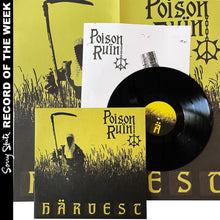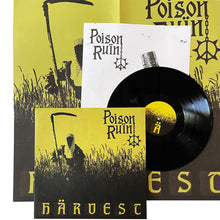Evoking a rich tapestry of ice-caked forests, peasant revolts, and silent knights, POISON RUIN stab at the pulsing heart of what it means to live under the permanent midnight of contemporary life. With Harvest, the band aligns their sonic palette to their godless, medieval-inflected aesthetic symbolism, creating a record which strikes with an assured sense of blackened harmony.
“I’ve always found fantasy tropes to be incredibly evocative,” vocalist Mac Kennedy notes, “that said, even though they are a set of symbols that seem to speak to most people of our generation, they are often either apolitical or co-opted for incredibly backwards politics.”
Kennedy reworks fantasy imagery as a series of totems for the downtrodden, stripping it of its escapist tendencies and retooling it as a rich metaphor for the collective struggle over our shared reality: “Instead of knights in shining armor and dragons, it’s a peasant revolt,” Kennedy explains, “I’m all for protest songs, but with this band I’ve found that sometimes your message can reach a greater audience if you imbue it with a certain interactive, almost magical realist element.”
The title track invokes images of feudal peasants, tithes, and money-hungry lords, sounding the horn of labor with the rallying cry, “Isn’t this our harvest? Isn’t this our feast to share?” Tales of the undead rising to take revenge upon those who have unknowingly wronged them spin out like pleasantly cathartic folktales (“Resurrection II”), while other tracks address the profound beauty and spirit of those making ends meet in the forsaken ends of POISON RUIN’s hometown of Philadelphia (“Blighted Quarter”). The band stares into the abyss of modern living with a sober and empathetic outlook, portraying our cracked reality as a complex and difficult to parse miasma of competing desires.
With Harvest, POISON RUIN have constructed a richly chilling fable out of modern living. Their tale is as lurid as it is seductive, as much a promising fantasy as it is a dreary portrait of reality itself.
Our take: From the first time I dropped the needle on Härvest, Poison Ruin’s third record and their first for Relapse, I was smitten. How can you not fall in love with a record that starts with a song as great as “Pinnacle of Ecstasy?” It’s a tour de force, moving from a guitar hook that could have powered an artyfact from the Nuggets era to an equally brilliant main riff to an anthemic chorus and into a heroic lead guitar freakout, moving from part to part with a poise and confidence that runs counter to Poison Ruin’s lo-fi production values. Speaking of which, if you thought moving to Relapse would water down Poison Ruin’s aesthetic, you are mistaken… if anything, Härvest leans on tones that are nastier and gnarlier than their previous records, but the production feels richer and more dynamic than on those releases. A big part of Poison Ruin’s appeal is their sound, a distinctive, cooked-down concoction of anarcho punk, oi!, and classic heavy metal, but even with such a heavy vibe, Härvest’s songs shine. This record takes everything that was so striking about Poison Ruin’s earlier records and just slams the gas pedal to the floor. The hooks are bigger, the riffs more distinctive and memorable, the performances crackle with even more energy, and the lyrical concept and execution is next-level by DIY punk standards. Poison Ruin doesn’t invite easy comparisons, but a good point of reference might be Subhumans. Like Subhumans, Poison Ruin has an identifiable sound and aesthetic and they craft ambitious songs that would lean toward prog’s pretensions if they weren’t so steeped in punk energy and venom. And in that context, Härvest is like Poison Ruin’s The Day the Country Died, where all the elements come together with a rush of excitement as intoxicating as your first drink. I could go into why I love each track on this record, but it’s enough to sayHärvest is a non-stop parade of hits, the work of a brilliant band at the height of their powers. Viva Poison Ruin!
“I’ve always found fantasy tropes to be incredibly evocative,” vocalist Mac Kennedy notes, “that said, even though they are a set of symbols that seem to speak to most people of our generation, they are often either apolitical or co-opted for incredibly backwards politics.”
Kennedy reworks fantasy imagery as a series of totems for the downtrodden, stripping it of its escapist tendencies and retooling it as a rich metaphor for the collective struggle over our shared reality: “Instead of knights in shining armor and dragons, it’s a peasant revolt,” Kennedy explains, “I’m all for protest songs, but with this band I’ve found that sometimes your message can reach a greater audience if you imbue it with a certain interactive, almost magical realist element.”
The title track invokes images of feudal peasants, tithes, and money-hungry lords, sounding the horn of labor with the rallying cry, “Isn’t this our harvest? Isn’t this our feast to share?” Tales of the undead rising to take revenge upon those who have unknowingly wronged them spin out like pleasantly cathartic folktales (“Resurrection II”), while other tracks address the profound beauty and spirit of those making ends meet in the forsaken ends of POISON RUIN’s hometown of Philadelphia (“Blighted Quarter”). The band stares into the abyss of modern living with a sober and empathetic outlook, portraying our cracked reality as a complex and difficult to parse miasma of competing desires.
With Harvest, POISON RUIN have constructed a richly chilling fable out of modern living. Their tale is as lurid as it is seductive, as much a promising fantasy as it is a dreary portrait of reality itself.
Our take: From the first time I dropped the needle on Härvest, Poison Ruin’s third record and their first for Relapse, I was smitten. How can you not fall in love with a record that starts with a song as great as “Pinnacle of Ecstasy?” It’s a tour de force, moving from a guitar hook that could have powered an artyfact from the Nuggets era to an equally brilliant main riff to an anthemic chorus and into a heroic lead guitar freakout, moving from part to part with a poise and confidence that runs counter to Poison Ruin’s lo-fi production values. Speaking of which, if you thought moving to Relapse would water down Poison Ruin’s aesthetic, you are mistaken… if anything, Härvest leans on tones that are nastier and gnarlier than their previous records, but the production feels richer and more dynamic than on those releases. A big part of Poison Ruin’s appeal is their sound, a distinctive, cooked-down concoction of anarcho punk, oi!, and classic heavy metal, but even with such a heavy vibe, Härvest’s songs shine. This record takes everything that was so striking about Poison Ruin’s earlier records and just slams the gas pedal to the floor. The hooks are bigger, the riffs more distinctive and memorable, the performances crackle with even more energy, and the lyrical concept and execution is next-level by DIY punk standards. Poison Ruin doesn’t invite easy comparisons, but a good point of reference might be Subhumans. Like Subhumans, Poison Ruin has an identifiable sound and aesthetic and they craft ambitious songs that would lean toward prog’s pretensions if they weren’t so steeped in punk energy and venom. And in that context, Härvest is like Poison Ruin’s The Day the Country Died, where all the elements come together with a rush of excitement as intoxicating as your first drink. I could go into why I love each track on this record, but it’s enough to sayHärvest is a non-stop parade of hits, the work of a brilliant band at the height of their powers. Viva Poison Ruin!
 Skip to content
Skip to content




